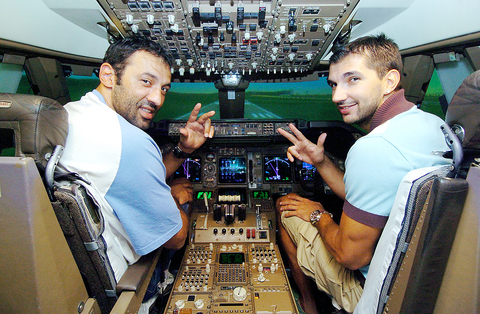Taiwanese airlines yesterday welcomed Premier Frank Hsieh's (謝長廷) announcement that the government will allow them to fly through China's air space, although a formal arrangement still has to be hammered out in negotiations between the two governments.
"It is good news for both carriers and consumers, who will be able to shorten their flying time," said Nieh Kuo-wei (
EVA Airways, the nation's second-largest carrier, said the new measure could help the company save between NT$150 million (US$4.7 million) and NT$200 million in fuel costs, although passengers would undoubtedly be the biggest beneficiary.

PHOTO: FANG PIN-CHAO, TAIPEI TIMES
Nieh said that six of EVA Airways' routes could be changed to fly over China's air space, which would strengthen the carrier's competitive edge.
Flying over China would shorten the Taipei-Paris route by one hour to 11 hours. Ten to 15 minutes could be shaved off the Taipei-Hanoi route, and the cargo flight between Taipei and New Delhi or Mumbai could be shortened by 15 to 30 minutes.
Boosted by the latest cross-strait development, share prices of EVA Airways soared 4.7 percent to NT$15.75 on the Taiwan Stock Exchange yesterday.
China Airlines (
However, the government will first have to issue formal documents making legal provision for flights across China, following which carriers will have to apply for approval from the Chinese government, Nieh said.
"There's nothing special in this case, as we all have to follow the customary practice of getting approval from the nations whose air space our aircraft will have to fly across," he said.
Currently, airliners have to skirt China's air space as stipulated in the Act Governing Relations Between Peoples of The Taiwan Area and the Mainland Area (
China Airlines, the nation's largest carrier, said it will conduct an assessment to choose suitable routes for the application.
The company currently operates 19 passenger flights and 13 cargo flights to Europe per week.
"It's hard to say how much we can save before carefully calculating the range of effects it will create," said China Airlines spokesman Johnson Sun (
"But we'll definitely apply for approval for flights between Taipei and New Delhi, Hanoi and Vienna," Sun said.
On the question of whether Hsieh's proposal would pave the way for direct links between Taiwan and China, Sun said that if direct charter flights across the Taiwan Strait could be launched on a regular basis, it would certainly be a good thing.
"It's too early to say that the government's message will act as a prelude to the implementation of direct links," Nieh said.
"It still requires some time of observation as there are other obstacles to be removed," he said.

MULTIFACETED: A task force has analyzed possible scenarios and created responses to assist domestic industries in dealing with US tariffs, the economics minister said The Executive Yuan is tomorrow to announce countermeasures to US President Donald Trump’s planned reciprocal tariffs, although the details of the plan would not be made public until Monday next week, Minister of Economic Affairs J.W. Kuo (郭智輝) said yesterday. The Cabinet established an economic and trade task force in November last year to deal with US trade and tariff related issues, Kuo told reporters outside the legislature in Taipei. The task force has been analyzing and evaluating all kinds of scenarios to identify suitable responses and determine how best to assist domestic industries in managing the effects of Trump’s tariffs, he

In a small town in Paraguay, a showdown is brewing between traditional producers of yerba mate, a bitter herbal tea popular across South America, and miners of a shinier treasure: gold. A rush for the precious metal is pitting mate growers and indigenous groups against the expanding operations of small-scale miners who, until recently, were their neighbors, not nemeses. “They [the miners] have destroyed everything... The canals, springs, swamps,” said Vidal Britez, president of the Yerba Mate Producers’ Association of the town of Paso Yobai, about 210km east of capital Asuncion. “You can see the pollution from the dead fish.

TIGHT-LIPPED: UMC said it had no merger plans at the moment, after Nikkei Asia reported that the firm and GlobalFoundries were considering restarting merger talks United Microelectronics Corp (UMC, 聯電), the world’s No. 4 contract chipmaker, yesterday launched a new US$5 billion 12-inch chip factory in Singapore as part of its latest effort to diversify its manufacturing footprint amid growing geopolitical risks. The new factory, adjacent to UMC’s existing Singapore fab in the Pasir Res Wafer Fab Park, is scheduled to enter volume production next year, utilizing mature 22-nanometer and 28-nanometer process technologies, UMC said in a statement. The company plans to invest US$5 billion during the first phase of the new fab, which would have an installed capacity of 30,000 12-inch wafers per month, it said. The

Taiwan’s official purchasing managers’ index (PMI) last month rose 0.2 percentage points to 54.2, in a second consecutive month of expansion, thanks to front-loading demand intended to avoid potential US tariff hikes, the Chung-Hua Institution for Economic Research (CIER, 中華經濟研究院) said yesterday. While short-term demand appeared robust, uncertainties rose due to US President Donald Trump’s unpredictable trade policy, CIER president Lien Hsien-ming (連賢明) told a news conference in Taipei. Taiwan’s economy this year would be characterized by high-level fluctuations and the volatility would be wilder than most expect, Lien said Demand for electronics, particularly semiconductors, continues to benefit from US technology giants’ effort